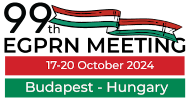Opinions of Primary Care Physicians Working in Istanbul Province on Telehealth Applications
Pinar Kocabaş, Nazlı Çoruhlu, Muhlise Odabaş, Zeynep Serra Tüzün, Gülsüm Melis Şahin, Pemra C. Unalan
Keywords: Telehealth, family medicine, artificial intelligence, primary care
Background:
Telehealth application is a framework that utilizes information and communication technologies, encompassing services such as video conferencing, secure messaging, internet-based computer, and phone applications, for the diagnosis, treatment, and prevention of diseases and injuries, as well as for research and evaluation purposes, accessible to all healthcare professionals.The aim of this study is to explore the opinions of primary care family physicians in our country regarding telehealth applications.
Research questions:
What is the role of technological tools in the daily practice of family physicians?
What is the status of family physicians' knowledge and use of artificial intelligence?
What are family physicians' opinions about telehealth?
Method:
102 Family Pshisician specialists and trainers included in this study. The survey form used consisted of three main sections: The first section included socio-demographic characteristics, second section included questions based on the Turkish-translated version of the validity and reliability study of the "Physicians Attitudes and Intentions to Use Telemedicine (PAIT)"scale, and the third section includes questions examining the opinions of family physicians on telehealth.Participants completed the survey online.Data were collected through voluntary participation with snowball sampling method.IBM SPSS 26.0 was used for data analysis.p<0,05 is accepted significant.
Results:
Participants included 55.9%(n=57) males. The mean age of participants was 40.0±9.3(min:26 max:63). 84.7%(n=86) of the participants were family medicine specialists.Average working time as a family physician was 10.9±6.7 years.When asked if they needed more information on the use of digital methods (1:Strongly Disagree,7:Strongly Agree), participants had an average score of 5.1±1.5. Average ratings of using artificial intelligence were:usefulness: 3.9±1.7,goodness:4.1±1.7,suitability:3.6±1.7.Participants under 40years of age and with less experience evaluated the use of artificial intelligence more positively.Family Medicine specialty trainees believed more strongly than Family Medicine specialists that telehealth applications will increase access to health services(p<0,05).
Conclusions:
These results highlight differences in perception and usage of digital methods,technological tools,artificial intelligence and telehealth among family physicians.
Points for discussion:
Can telemedicine contribute to our daily practice in primary care?
Do you think you need more information about telehealth practices in primary care?
Does using artificial intelligence methods improve clinical quality?
#26

